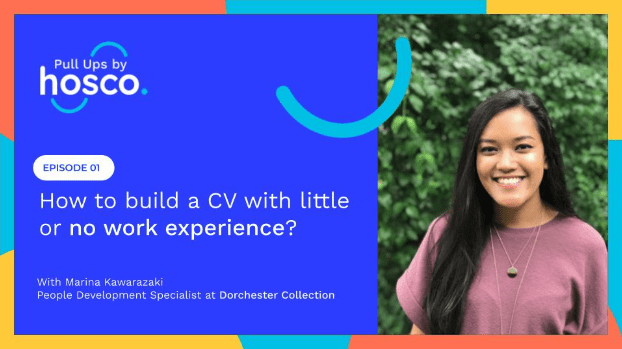So you’re looking to get your start in the hospitality industry but you lack some experience and are wondering how to build a CV that will get responses.
Well, you’ve come to the right place.
The Hosco team is here to help with our new series, Hosco Pull-Ups. We are going to be hitting the virtual gym with some excellent hospitality personal trainers to get you and your CV in shape for the job hunt that lies ahead.
In our first edition, we welcomed Dorchester Collection’s People Development Specialist Marina Kawarazaki to share her expertise and knowledge. Marina draws from her recruitment experience to give some crucial tips about how to build a strong CV with little to no formal experience.
So, throw on your gym clothes and let’s get this workout started!
How Long Does It Take to Look At a CV?
70% of respondents said that they don't spend more than one minute looking at a single CV, with 40% saying they spend 30 seconds or less on each applicant.
“As a recruiter, I wouldn’t spend more than 30 seconds on a single CV given the amount of applications we get for each vacancy we are trying to fill,” says Marina.
“If I spend 30 seconds on an applicant and I have 100 applications, that’s already five hours out of my day,” she says. “Plus, HR managers usually have multiple roles open, the interviews take time, and we have to meet with managers to plan a recruitment strategy as well. Clearly, that doesn’t leave much time to look at each CV with a fine toothed comb.”
What Information is the Most Important to Recruiters?
The respondents to the survey said that work/volunteer experience is the section they spend the most time reviewing, followed by education, skills, personal statement, contact information, and extracurricular activities, in that order.
“This is really interesting to me because I, personally, would have put extracurriculars much higher on this list,” says Marina. “For candidates without much work experience, I think that, as a new graduate, it’s important to include any volunteer work, position you’ve held, or project you’ve worked on where you’ve created value.”
“The most important thing for the hiring manager or recruiter is that you fill the gaps because we won’t understand what value you’ve brought to other people unless you explain it on your CV, in detail,” she says.
What is the Best Way to Present the Information on My CV?
When it comes to laying out a CV, it can be difficult to be sure which approach is best. However, our survey respondents ranked descriptive bullet points as the best way to present information. Using only key words, writing a descriptive paragraph, and telling a story/giving examples ranked 2nd, 3rd, and 4th, respectively.
“So, with bullet points, it allows the recruiter to fully understand what was done and what the applicant achieved. If you only use key words, it might be more difficult for them to get a clear picture of what you’ve accomplished,” says Marina. “Using descriptive bullet points allows you to give the recruiter more information so they know the full range of your experience.”
And what about incorporating some color or creative elements into your CV?
“Personally, my CV is in black and white but I get some really creative CVs with color and they do draw me in or at least grab my attention. I wouldn’t go too wild because it is a professional document, but a little bit of color is fine,” she says.
What Should I Explain in my Personal Statement?
This is a section of the survey in which the respondents and our expert have differing opinions.
“I think explaining your value to a team and your general strengths are the two most important things to include in a personal statement, followed by your future ambitions,” says Marina. “Because, as someone looking to fill a role, I want to know what that person can bring to the team and understand their strengths.”
“Future ambitions are something that can be discussed during an interview. I don’t think it’s relevant or necessary to include in your personal statement when it needs to be brief and to the point,” she says. “But I’d be happy to discuss your future ambitions during the interview process.”
“Also, with the personal statement, I’d like to see it apply specifically to the company or job and not just a generic template.”
How Long Should a CV Be?
In terms of CV length, an overwhelming majority of respondents said that they should be no more than one page long.
“As I said before, we only have about 30 seconds to look at each CV, so one page is the perfect length to give me a snapshot of the candidate,” says Marina. “Regardless if you’ve had a long career or a short career, one page is enough if you only include the experience that is truly relevant to the role you are applying for.”
“The CV is just the cover of the book and then the interview process is getting to know the story of the person. You just want to include enough information to draw the recruiter in and get them to invite you for an interview,” she says.
Should I Include My Social Media Accounts?
As you can see, the survey was virtually split down the middle on this question, with a slight majority saying that they didn’t think it was relevant to include social media accounts.
“I agree with the majority on this one, although it may be relevant for certain types of jobs or positions, such as social media manager,” says Marina. “But, generally speaking, I would advise against including your personal social media accounts because it could create bias in the recruiting process. You don’t want a recruiter to be making decisions from looking at your personal photos, you want them to be looking at your professional experience.”
“I do think it’s okay to include professional social network profiles, like Linkedin and Hosco. Most of the things on those channels should already be on your CV anyway, so it’s a safe space for you to post and for recruiters to look at your interactions,” she says.
Well, that’s it for this session of Hosco Pull-Ups. Now you should be able to move forward and build a CV with confidence, regardless of your level of experience.
And check out the full video of our first session of Hosco Pull-Ups below to get more insight on how to build a strong CV to get your career started.




